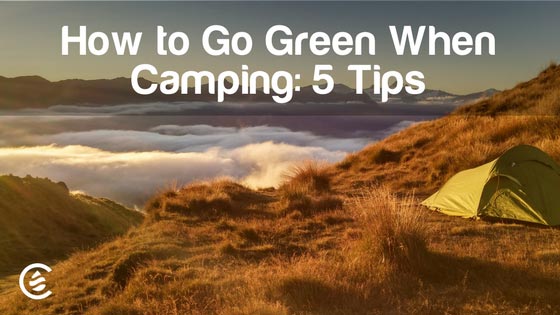
Camping is about getting outside and enjoying nature. Unfortunately, when we bring lots of waste and chemical-based products along with us, we can threaten the very nature we hope to appreciate.Green camping is a way of making our outdoor outings as eco-friendly and responsible as possible. As the saying goes: Take only pictures, leave only footprints. From reducing waste to preserving nature, here are 5 green camping tips.
1. Go Non-Toxic With Your Bug Spray, Sunscreen and Toiletries
Traditional, chemical-based products threaten the air, water and wildlife, not to mention your friends and family. Go with a naturally sourced bug spray instead, and when it comes to sunscreen and toiletries, make sure they’re non-toxic and biodegradable. Also shoot for recyclable or reusable packaging.
2. Leave Behind the Electronics
Other than your cell phone and a flashlight (and GPS if you need it) leave the electronics at home. You’re out in the wild, so appreciate it! MP3 players, handheld video games, tablets—leave them all behind. Consider going solar when charging your devices, too.
3. Use Eco-Friendly Gear
Switching to more sustainable and responsibly sourced gear options is a big part of making your camping experience more green. Plastic tents, for instance, can sit in landfills for generations after their final use. For sleeping bags and tents, look for options made from 100% recycled materials. Nearly all tents come with some type of water-resistant coating as well as dyes, so aim for options that contain no toxic dyes and coatings that are solvent-free. If these options aren’t available to you, consider borrowing or purchasing used equipment to reduce manufacturing waste.
Dishes are another way to cut down on your environmental footprint. No matter how tempting, don’t resort to disposable plates and utensils—they’re super bad for the environment. Use reusable dishes instead, like lightweight titanium for example.
4. Ditch Plastic Water Bottles
Rolling up to a campsite with a few cases of plastic water bottles is just the worst thing ever. That’s a TON of waste, first of all. Second of all, if the campground requires you to carry out your trash, well that’s a whole bunch of stuff to pack out. Plus, plastic means chemicals are leaching into your drinking water—gross! Bring a reusable water bottle instead, along with a few gallons of extra water when you need a refill.
5. Take Care of Business—Responsibly!
Maybe this should have been #2 on the list, but either way, it’s time we all learned how to take care of our business in a way that’s respectful of the environment. If there’s no outhouse or composting toilet near your campsite, here’s what you need to do:
- Bring your own toilet paper (We like this one from Seventh Generation) and a bag to dispose of it in
- #1 or #2 it doesn’t matter, you need to find a secluded spot that’s at least 200 feet from the closest campsite or water source
- Dig a hole at least 6 inches deep, and promptly cover it after you’re finished
- Remember that bag you brought to dispose of the soiled toilet paper? Never leave that thing behind—make sure to camp it out or find a way to dispose of it properly

